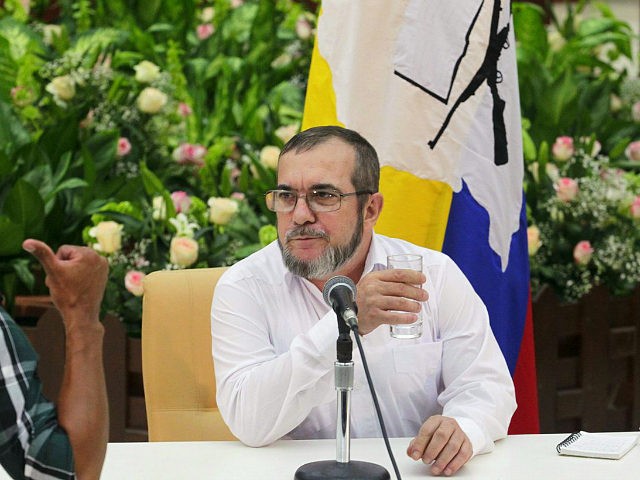The head of the Revolutionary Armed Forces of Colombia (FARC), the terrorist known as “Timochenko,” has returned from Cuba to sign an accord with Colombian President Juan Manuel Santos that will grant most of the members of the world’s wealthiest non-jihadist terror organization impunity in exchange for community service.
“Peace begins Monday when President Santos and I shake hands,” Timochenko told reporters upon arriving in Cartagena, a coastal city that will be the setting of the signing of a peace deal brokered under the auspices of communist dictator Raúl Castro.
As the FARC is a Marxist group, Castro provided Timochenko, Iván Márquez, and a small number of the group’s leaders sanctuary following their decimation during the tenures of Presidents Álvaro Uribe and George W. Bush, who used the same counterterrorism tactics against the FARC as those being used in Afghanistan and Iraq against jihadi groups.
Timochenko has arrived in Cartagena after leading the FARC’s Tenth Guerrilla Conference deep in the Colombian rain forests. “I am leaving satisfied because there was full support from the guerrilla for the agreement we will sign Sunday… the war will end then,” Timochenko said.
The agreement will be signed at a ceremony where 2,500 guests are expected, among them 17 heads of state and Secretary of State John Kerry. The pen used for the signatures has been crafted out of used bullets.
The signatures will not necessarily mean that Colombia will ratify the peace deal. In order for the government to take the actions provided for in the agreement, the public must vote “yes” in a referendum scheduled for October 2. The government has not provided for what may happen if Colombians vote “no,” though US News and World Report notes that a “no” vote would tie the President’s hands and require Congress to pass a bill ratifying the deal if the government wants to override the vote. A “yes” vote would allow the executive to take unilateral action to implement it.
The “yes” vote is currently winning in the latest national polls, though questions asking whether the public agrees to specific provisions of the deal seem to indicate many do not understand the implications of a “yes” vote.
A poll conducted last week by the firm Cifras & Conceptos found 54 percent of Colombians are planning to vote yes. Another poll by the firm Invamer found, however, that Colombians asked whether they supported granting FARC terrorists the ability to run political campaigns without serving prison time overwhelmingly rejected the idea, a key provision in the peace deal. 74 percent of respondents said they would not want to see FARC terrorists avoid prison time and run for office.
FARC leaders have confirmed they are planning to launch congressional candidates in 2018 as members of a FARC party.
The deal would allow most FARC terrorists to escape prison sentences, instead, being allowed to conduct community services. Only those found guilty of “crimes against humanity,” not “political crimes,” would be sent to prison by the special FARC tribunal. The list of crimes designated one or the other category has not yet been released. It is unclear whether some crimes such as cocaine trafficking, forced abortions, rape, and abduction would count as “political crimes.”
As a result, those Colombians who live in the nation’s interior, where the FARC has been most active, are hesitant to accept the deal, particularly because the terror group continues to wreak havoc far from Timochenko’s authority. Fox News reports that, in sleepy mountainside towns like Puerto Rico, FARC terrorists are still extorting villages for “vaccines” from violence.

COMMENTS
Please let us know if you're having issues with commenting.